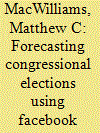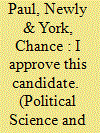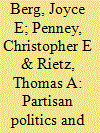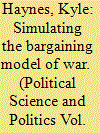|
|
|
Sort Order |
|
|
|
Items / Page
|
|
|
|
|
|
|
| Srl | Item |
| 1 |
ID:
141827


|
|
|
|
|
| Summary/Abstract |
In this article, we chronicle our experience in team-teaching large-lecture sections of “Introduction to American Government.” A dual-instructor approach allows us to accommodate 250 students, which obviates the need for five separate sections (and instructors) of the course. In addition, our “Crossfire Approach,” in which we engage one another in frequent and unstructured political debate, generates student interest in the course and in the political science major. Students who were enrolled in this course from 2007 through 2011 were significantly more likely to declare political science as their major than those who took it from any other instructor or either of us teaching it individually. This approach conserves departmental resources while simultaneously growing the program—a clear win-win situation.
|
|
|
|
|
|
|
|
|
|
|
|
|
|
|
|
| 2 |
ID:
141829


|
|
|
|
|
| Summary/Abstract |
Using the core principles of fantasy sports, I propose the notion of using fantasy drafts in political science classrooms. I begin by introducing the basic concept of fantasy leagues. Then I describe an original 30-minute game in which students draft US presidents and “compete” against one another along a number of dimensions. Next, I present possible writing assignments related to the game. The conclusion discusses the contributions of “Fantasy Presidents”—namely, it offers interesting essay prompts and informed discussions, and it encourages students to take the initiative in their own learning.
|
|
|
|
|
|
|
|
|
|
|
|
|
|
|
|
| 3 |
ID:
141826


|
|
|
|
|
| Summary/Abstract |
Much attention has been centered on the use of emerging technologies in higher education, including flipped classes. However, widespread admiration for and adoption of these innovations seems to be occurring at a much faster pace than the assessment and evaluation of them. Questions about student performance in and perception of flipped classes remain unanswered, so more research is needed. This study examines student perceptions of a partially flipped Introduction to American Politics course. In general, the results indicate that students preferred the partially flipped format, although (1) it is not clear that students would prefer a fully flipped course, and (2) some aspects of the flipped format worked better than others.
|
|
|
|
|
|
|
|
|
|
|
|
|
|
|
|
| 4 |
ID:
141821


|
|
|
|
|
| Summary/Abstract |
Facebook constantly tracks the growth of each congressional candidate’s fan base and the number of people engaging with candidates online. These Facebook metrics comprise a rich dataset that theoretically may capture the effectiveness of campaigns in building participatory support as well as their potential to mobilize support. When added to electoral fundamentals similar to those used in national-election forecasting, can Facebook data be used to develop a reliable model for predicting vote-percentage outcomes of individual congressional contests? The results of an exploratory investigation reveal that fan participation and mobilization metrics tracked by Facebook produced surprisingly accurate election predictions in the 2012 US Senate races studied. The question remains, however, whether these results are a “flash in the 2012 pan” or an indication that using Facebook statistics to measure campaign effectiveness is a new tool that scholars can use to forecast the outcome of congressional campaigns.
|
|
|
|
|
|
|
|
|
|
|
|
|
|
|
|
| 5 |
ID:
141822


|
|
|
|
|
| Summary/Abstract |
Contextual and strategic factors that influence the use of endorsements in political advertisements represent an underexplored area of the scholarly literature, resulting in a gap between the art and science of campaigning and the advertising-effects literature. This article uses data from the Wisconsin Ad Project to study endorsements in ads aired during the 2008 election cycle. We show that endorsements are used strategically by campaigns and that four factors—candidate characteristics, campaign characteristics, ad format, and timing—affect whether an ad containing an endorsement is aired. Specifically, endorsements are more likely to appear in positive ads, are primarily used by incumbents and female candidates, are less likely to appear in competitive races, and tend to air less frequently as a campaign progresses.
|
|
|
|
|
|
|
|
|
|
|
|
|
|
|
|
| 6 |
ID:
141820


|
|
|
|
|
| Summary/Abstract |
Using the Iowa Electronic Markets (IEM), this article assesses the political impact of several important events during the fall of 2013: the US government shutdown, the Senate elimination of filibusters for presidential nominations (i.e., the “nuclear option”), and the implementation of the Patient Protection and Affordable Care Act (i.e., ObamaCare). Did these events have meaningful effects on congressional control prospects in the 2014 election? According to IEM price changes, Republican chances fell dramatically when the government shut down, and they did not recover on resolution. Eliminating filibusters had a negative impact on Democratic chances. Various aspects of the ObamaCare rollout and reporting, as well as new announcements that incumbents would not run for reelection, had little effect. In contrast, the budget resolution reinforced the status quo. Overall, political rhetoric does not appear to affect congressional control prospects. Instead, actions matter: deliberate partisan actions of Congress adversely affect the initiating party’s prospects, whereas bipartisan initiatives help the party that initiates the bipartisan effort.
|
|
|
|
|
|
|
|
|
|
|
|
|
|
|
|
| 7 |
ID:
141828


|
|
|
|
|
| Summary/Abstract |
To involve students in the process of grounding abstract concepts in their own concrete life experiences, I began working with a type of reflective exercise that I call the “political life story,” in which students create and share narratives around the political phenomena that have shaped their own lives. Building on the experiences of other political scientists who have used active-versus-passive learning to disentangle conceptual ambiguity—as well as similar best practices of student-centered pedagogy that are well established in the discipline—I offer these reflections in the spirit of deepening the conversation about methods of reflective group learning with diverse students in both classroom and online contexts. My observations reinforce the consistent finding in the wider pedagogical literature that diverse classrooms provide a conducive environment for deep learning when particular emphasis is placed on the lived experiences of students.
|
|
|
|
|
|
|
|
|
|
|
|
|
|
|
|
| 8 |
ID:
141824


|
|
|
|
|
| Summary/Abstract |
As new academic journals have emerged in political science and existing journals experience increasing submission rates, editors are concerned that scholars experience “reviewer fatigue.” Editors often assume that an overload of requests to review makes scholars less willing to perform the anonymous yet time-consuming tasks associated with reviewing manuscripts. To date, there has not been a systematic investigation of the reasons why scholars decline to review. We empirically investigated the rate at which scholars accept or decline to review, as well as the reasons they gave for declining. We found that reviewer fatigue is only one of several reasons why scholars decline to review. The evidence suggests that scholars are willing to review but that they also lead busy professional and personal lives.
|
|
|
|
|
|
|
|
|
|
|
|
|
|
|
|
| 9 |
ID:
141830


|
|
|
|
|
| Summary/Abstract |
This article outlines a classroom simulation for teaching the bargaining model of war. This model has become one of the most important theories of international conflict, but the technical notation often used to illustrate it is troublesome for some students. I describe a simple card game that can be integrated into a broader strategy for conveying the bargaining model’s core insights. I also highlight ways in which the game can be modified to focus on different aspects of the model’s logic.
|
|
|
|
|
|
|
|
|
|
|
|
|
|
|
|
| 10 |
ID:
141825


|
|
|
|
|
| Summary/Abstract |
To conduct a policy analysis, students must master foundational concepts and apply them using critical and evaluative thinking. A film-based assignment allows students to practice the steps of policy analysis in a low-stakes setting that requires a limited investment of time. Ideally, the assignment is used as an initial practice exercise before engaging in applied projects later in the semester. The applied projects are enhanced because students already have used the steps of policy analysis and been given feedback in a sheltered setting. We suggest using animated films for this assignment because they force students to define problems, solutions, and criteria without reference to existing practices or dominant perspectives. Therefore, student time and instructor feedback is devoted to developing what Bardach termed “first-rate thinking.” Concentrating attention on logical thought processes builds a strong foundation for further training in policy analysis.
|
|
|
|
|
|
|
|
|
|
|
|
|
|
|
|
| 11 |
ID:
141831


|
|
|
|
|
| Summary/Abstract |
In 2001, Richard Niemi and Julia Smith published an article in PS: Political Science and Politics on enrollments in high school civics and government courses. They framed their study on the premise that political scientists were ignoring an important aspect of American civic and political life, and they concluded by issuing a call for political scientists to become more involved in K-12 civics education. This article provides an update on the state of K-12 civics education and renews Niemi and Smith’s call for political science engagement in K-12 education.
|
|
|
|
|
|
|
|
|
|
|
|
|
|
|
|
| 12 |
ID:
141823


|
|
|
|
|
| Summary/Abstract |
Graduate students and young scholars with a passion for making a difference in the real world through research are often advised to put those dreams to rest until after tenure. This contributes to the enduring frustration on both sides of the “theory–policy gap” but it is sound advice—as of right now tenure decisions tend not to take into account publications appearing in policy outlets. However, the job market—and some of the most important mechanisms used for making promotion decisions in academia—suggest good strategic reasons for trying to have your research influence policy as early in your career as possible.
|
|
|
|
|
|
|
|
|
|
|
|
|
|
|
|
|
|
|
|
|